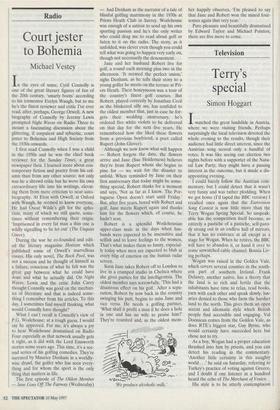Radio
Court jester to Bohemia
Michael Vestey
In the eyes of some, Cyril Connolly is one of the great literary figures of fun of the 20th century, 'smarty boots' according to his tormentor Evelyn Waugh, but to me he's the finest reviewer and critic I've ever read, after, perhaps, George Orwell. A new biography of Connolly by Jeremy Lewis prompted Night Waves on Radio Three to mount a fascinating discussion about the glittering, if corpulent and sybaritic, court jester to Bohemia and High Society from the 1930s onwards.
I first read Connolly when I was a child in the 1950s and he was the chief book reviewer for the Sunday Times, a great newspaper then. I learned more about con- temporary fiction and poetry from his col- umn than from any other source; not only was he a shrewd critic but he wove his own extraordinary life into his writings, elevat- ing them from mere criticism to near-auto- biography. At Eton with Orwell, at Oxford with Waugh, he seemed to know everyone. He had Oscar Wilde's gift for the apho- rism, many of which we still quote, some- times without remembering their origin: 'Imprisoned in every fat man a thin one is wildly signalling to be let out' (The Unquiet Grave).
During the war he co-founded and edit- ed the literary magazine Horizon which published some of Orwell's marvellous essays. His only novel, The Rock Pool, was not a success and he thought of himself as a failure, conscious of what he felt was the great gap between what he could have done and what he actually did. On Night Waves, Lewis and the critic John Carey thought Connolly was good on the mechan- ics of literature and that is indeed some- thing I remember from his articles. To this day, I sometimes find myself thinking, what would Connolly have thought?
What I can't recall is Connolly's view of P.G. Wodehouse; at a rough guess, I would say he approved. For me, it's always a joy to hear Wodehouse dramatised on Radio Four especially as that network usually gets it right, as it did with the Lord Emsworth stories some years ago. This time, it's a sec- ond series of his golfing comedies. They're narrated by Maurice Denham in a worldly- wise drawl, the golfer who has seen every- thing and for whom the sport is the only thing that matters in life.
The first episode of The Oldest Member — Jane Goes Off The Fairway (Wednesday) — had Denham as the narrator of a tale of blissful golfing matrimony in the 1930s at Priors Heath Club in Surrey. Wodehouse was enough of a satirist to send up his own sporting passion and he's the only writer who could drag me to read about golf or listen to it on the radio. The story, as it unfolded, was clever even though you could tell what was going to happen very early on, though not necessarily the denouement.
Jane and her husband Robert live for golf, a round each morning plus two in the afternoon. 'It seemed the perfect union,' sighs Denham, as he tells their story to a young golfer he meets on the terrace at Pri- ors Heath. Their honeymoon was a tour of the country's finest golf courses. But Robert, played correctly by Jonathan Cecil as the blinkered silly ass, has confided to the oldest member that, just in case he for- gets their wedding anniversary, he's ordered five white violets to be delivered on that day for the next five years. He remembered how she liked these flowers from a previous boyfriend, a poet called Rupert (John Glover).
Although we now know what will happen — Robert forgets the date, the flowers arrive and Jane (Sue Holderness) believes they're from Rupert whom she begins to pine for — we wait for the disaster to unfold. When reminded by Jane on their first anniversary that today might be some- thing special, Robert thinks for a moment and says, 'Not as far as I know. The Por- tuguese Open doesn't start until Friday.' But, after five years, bored with Robert and golf, Jane meets Rupert again and thanks him for the flowers which, of course, he hadn't sent.
Robert is a splendid Wodehousian upper-class male in the days when hus- bands were expected to be insensitive and selfish and to leave feelings to the women. That's what makes them so funny, especial- ly today when men are expected to blub at every blip of emotion on the human radar screen.
Soon Jane takes Robert off to London to live in a cramped studio in Chelsea where she gives parties for the intelligentsia. The oldest member says sorrowfully, 'This had a disastrous effect on his golf.' After a sepa- ration, Robert by now back in the country swinging his putt, begins to miss Jane and vice versa. He needs a golfing partner, 'What shall it profit a man if he does a hole in one and has no wife to praise him?' They're reunited and, as the oldest mem- 'We produce alcoholic milk' ber happily observes, 'I'm pleased to say that Jane and Robert won the mixed four- somes again that very year.'
Pure pleasure and beautifully dramatised by Edward Taylor and Michael Pointon; there are five more to come.


































































 Previous page
Previous page